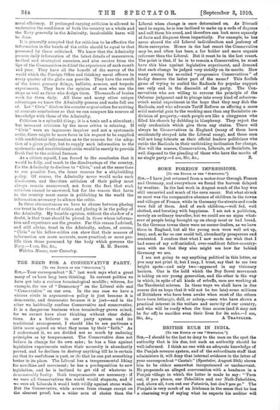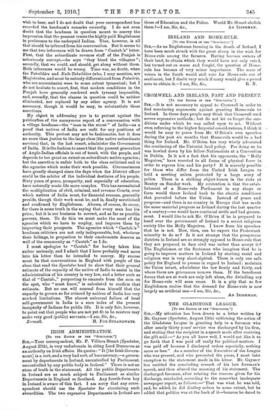BRITISH RULE IN INDIA.
[To THE EDITOR or THE firscrwrove."]
SIR,—I should be the last to deny to the man on the spot the authority that is his due, but such an authority should be well-informed. I think no one with an adequate knowledge of the Punjab revenue system, and of the subordinate staff that administers it, will deny that internal evidence in the letter of your correspondent "Cantab." (Spectator, August 2001) shows him to be either somewhat inexperienced or unobservant. He propounds an alleged conversation with a headman in a Punjab village in which the latter is made to say : "Turn out, if you please, our Taktilddre and our Haib-Tahtildesrs, and, above all, turn out our Patwarie, but don't you go." The Punjabi is very much of an Irishman in the sense that he has a charming way of saying what he expects his auditor will
- wish to hear, and I do not doubt that your correspondent has • recorded the headman's remarks correctly. I do not even ' doubt that the headman in question meant to convey the • impression that the peasant trusts the highly paid Englishman • in preference to the underpaid Indian. That, however, is all that should be inferred from his conversation. But it seems to me that two inferences will be drawn from " Cantab.'s" letter.
• First, that the subordinate revenue staff of the Pnnjab is notoriously corrupt.—ho says "they bleed the villagers "; secondly, that we could, and should, get along without them. Both inferences would be wrong. Time was, no doubt, when the Tahsilddre and Naib-Taheilddre (who, I may mention, are Magistrates, and must be entirely differentiated from Paiteciris, who are accountants) were to some extent tyrannical; but I do not hesitate to assert, first, that modern conditions in the Punjab have generally rendered such tyranny impossible, and, secondly, that the classes in question could be neither eliminated, nor replaced by any other agency. It is not necessary, though it would be easy, to substantiate these assertions.
My object in addressing you is to protest against the publication of the anonymous report of a conversation with a village headman—the "man in the street" of India—as a proof that natives of India are unfit for any positions of authority 4 This protest may not be fashionable, but it does no more than justice to the large class (the native subordinate services) that, in the last resort, administer the Government of India. It is the fashion to assert that the present generation of Anglo-Indian officials is out of touch with the people, and depends to too great an extent on subordinate native agencies ; but the assertion is unfair both to the class criticised and to the agencies which make their work possible. Circumstances have greatly changed since the days when the District officer could be the arbiter of the individual destinies of his people. Sixty years of peace, prosperity, and especially of education, have naturally made life more complex. This has necessitated the multiplication of civil, criminal, and revenue Courts, over which natives of India must, for financial reasons, generally preside, though their work must be, and is, finally scrutinised and confirmed by Englishmen. Abuses, of course, do occur, for there is some truth in the saying that every man has his price ; but it is our business to correct, and as far as possible prevent, them. To do this we must make the most of the agencies which we have to employ, and improve them by improving their prospects. The agencies which " Cantab.'s " headman criticises are not only indispensable, but, whatever their failings, in proportion to their emoluments deserve as well of the community as " Cantab." or I do.
I must apologise to " Cantab." for having taken him rather seriously, and I admit that I have probably read more into his letter than he intended to convey. My excuse must be that conversations in England with people of the class that read the Spectator tend to show that their general estimate of the capacity of the native of India to assist in the administration of his country is very low, and a letter such as that of " Cantab.," purporting to emanate from the man on the spot, who "must know," is calculated to confirm that estimate. But no one will conceal from himself that the capacity to govern so far evinced by natives of India has very marked limitations. The almost universal failure of local self-government in India is a sure index of the present incapacity of Indians for public life. It is only fair, however, to point out that people who are not yet fit to be masters may make very good (public) servants.—I am, Sir, &c.,











































 Previous page
Previous page